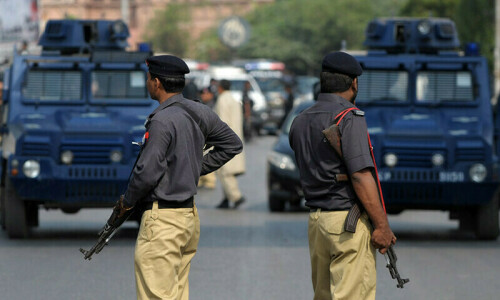 KARACHI, March 14: As the city’s power demand surged to 2,000 megawatts with the rise in temperature and the Karachi Electric Supply Corporation faced a shortage of 555MW amid a dwindling generation capacity and an unresolved financial dispute with the Pakistan Electric Power Company (Pepco) on Friday, citizens strongly resented the KESC chief’s statement of passing the buck to them.
KARACHI, March 14: As the city’s power demand surged to 2,000 megawatts with the rise in temperature and the Karachi Electric Supply Corporation faced a shortage of 555MW amid a dwindling generation capacity and an unresolved financial dispute with the Pakistan Electric Power Company (Pepco) on Friday, citizens strongly resented the KESC chief’s statement of passing the buck to them.
Despite the persisting power demand, two units of Bin Qasim Power Plant could not be restored till Friday evening. Sources said that Unit No 4 would resume functioning within the next couple of days, while Unit No 1 would remain out of commission till April 10. A team of Japanese experts, meanwhile, arrived for the repair of the faulty units of Korangi Thermal Power Plant.
Although the KESC claimed that it was carrying out load-shedding for two hours in residential areas four times a day, residents complained that the duration of each spell was even beyond three hours. The power crisis also caused a shortage of potable water in residential areas.
Residents from Block 13 D/1, Gulshan-i-Iqbal complained that power went off for more than seven times a day. They also complained that no one from the KESC Complaint Centre responded to their calls.
Similar complaints were also received from Block 8, Clifton. Area residents said they were without electricity for several hours beyond the stipulated timeframe announced for load-shedding.
 The power crisis has also hit industrial areas, where the duration of load-shedding has been increased to seven hours daily.
The power crisis has also hit industrial areas, where the duration of load-shedding has been increased to seven hours daily.
With a meeting of the water and power secretary with the chiefs of the KESC and Pepco scheduled for March 18 to settle the outstanding financial matter and resolving power crisis in the city, KESC chief retired General Mohammad Amjad told private TV channels that his utility would not take a loan from any bank for the payment of Rs3 billion to Pepco by April 1. But, he added, if the National Electric Power Regulatory Authority (Nepra) issued a notification, the fuel adjustment charges and power purchase charges would be passed on to consumers.
His statement was strongly resented by KESC consumers. They criticised the privatised KESC for failing to provide uninterrupted power supply to residential and industrial areas. They slammed the utility’s management for not investing in improvement of generation and distribution. Besides, they said that the utility failed to recover its outstanding dues from some private and public sector consumers.
They maintained that citizens who regularly paid their bills should not be penalised for the KESC management’s dubious standards. They demanded that the new owners should be made to explain why they did not invest in the system’s development in violation of the agreement they had signed while taking over the utility.
The dispute between the KESC and Pepco has assumed political dimensions as the repercussions of recurrent power failures and power tariff increase can affect the newly elected government.
Nafees Siddiqui, Sindh chapter’s general secretary of the Pakistan People’s Party, termed it a conspiracy against the upcoming elected government. He also slammed Wapda and Pepco for putting the KESC on notice and cutting off power supply all of a sudden after the February 18 general election. He cautioned Wapda not to push the KESC for any agreement in haste. He called upon the upcoming government to review the decision of privatising the utility and find a way out for utility’s revival as a strategic public-private partnership symbol in the country.
It may be mentioned that Wapda was charging Rs3.69 per unit from the KESC before its privatisation in 2006. The rate was raised to Rs8.40 by Nepra on a petition filed by Wapda. Since the raise was not notified the KESC was maintaining that it would purchase power at the rate of Rs3.69 a unit. The KESC was also asking Nepra to allow its demand for increase in fuel adjustment charges which the KESC chief said might be passed on the consumers.
The failure of the KESC management was evident from the findings of a prime ministerial committee which noted that Rs23.986 billion outstanding on Nov 24, 2005 had since ballooned to Rs26.379 billion. As Rs3.097 billion had been reported to be recovered from the former figure, a stupendous Rs5.490 billion of arrears had been added to the figure of recoverable from the revenue. Receivables on May 31, 2007 were Rs26,379,355,000 against public and private sectors. According to the findings of the special committee constituted on June 30, 2007, receivables against the federal government on May 31, 2007 were Rs1,265.089 million; against Sindh government Rs270.089 million; Balochistan government Rs8.469 million; city government Rs856.108 million and KWSB Rs3,145.164 million. The total receivables were Rs5,544.919 million. The total outstanding against private sector for the same period was Rs20,834.436 million.















































Dear visitor, the comments section is undergoing an overhaul and will return soon.